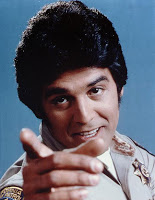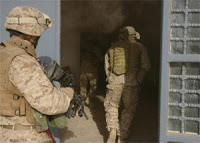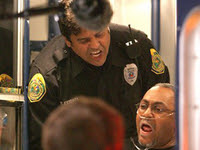Get The Cuffs, Ponch

Like many women her age, my lovely wife Korrin harbored a rather substantial teenage crush on Erik Estrada. For six seasons the Puerto Rican-American television performer (calling him an “actor” would leave the truth with a severe contusion) essayed the role of a California Highway Patrol motorcycle officer saddled with the improbable name Francis Llewellyn “Ponch” Poncharello on CHiPS.
When she caught a glimpse of a recent photograph of Mr. Estrada, Korrin’s expression silently quoted Milton’s famous lament, “Time, the subtle thief of youth….” To my eyes it appeared that the erstwhile pin-up boy wears his decades well, even though a toupee is now necessary to supplement his once-luxuriant hair. (In that respect, at least, I have the better of him, since my hair — what remains of it — is all mine, and not in the sense that my check to Sy Sperling cleared the bank.) [It turns out that the foregoing comments about the authenticity of Mr. Estrada’s hair are misinformation arising from a “Stupid Human Trick” he once performed for David Letterman; please see the first comment below, and forgive me for my error.]
Estrada was recently rescued from the purgatory of 3:00 a.m. reruns and Mexican telenovelas by an offer to do a new prime time program called “Armed & Famous,” in which he can be seen swaggering around in a police uniform, but this time it’s for “real” — or at least as real as “Reality TV” gets, which isn’t very.
The program’s gimmick is to take Estrada and four other quasi-psuedo-demi-semi-celebrities (LaToya Jackson, who’s never been seen together with her alleged “brother,” Michael; former female professional “wrestler” Trish Stratus; Jon “Wee Man” Acuna, professional skater and semi-professional human projectile in the imbecile-chic “Jackass” television and movie series; and Jack Osbourne, the spawn of Ozzy and Sharon), put them through police training, and deploy them on the streets of Muncie, Indiana as sworn officers of the local police department.
At this point, the second question that naturally occurs to a rational person (the first being, “Where’s Steve Guttenberg?”) is this: If law enforcement is such a dangerous profession and sacred trust, why is it being used as ‘Reality TV’ fodder?
The insidious thing about “Armed & Famous” and other specimens of “criminal verite programming,” notes Richard Rapaport, a visiting scholar at the UC Berkley Institute of Governmental Studies, is that “they have helped set a national tone in which both the police and the policed have been convinced that appropriate law-enforcement correlates with high-speed chases, blocking and tackling, drawn weapons, and a shoot-first, think-later mind-set.”
Rapaport’s point is illustrated quite nicely in an on-line video clip from “Armed & Famous.” One of the police instructors, expressing what is most likely scripted frustration over the delinquencies of the faux-celebrity rookies, decides to play an allegedly hysterical joke on them: While the group is gathered in a room to discuss their SWAT training, the instructor throws a flash-bang diversionary grenade in their midst and charges into room with another officer, unloading several paint-pellet rounds at the startled trainees.
Doubtless because of reflexes honed by playing Officer Ponch decades ago, Estrada’s reaction was to hit a knee and begin shooting back “at anything that wasn’t my partner.”
The incident was framed as a playful stunt; I mean, who wouldn’t get a charge out of throwing a flash grenade into a knot of easily startled people?
Well, how about rational people who appreciate the dangers of fooling around with grenades of any kind?
Last July, the town of Hempstead, Texas was forced to more than half of its police force, and felony charges were issued against them, for incident in which officers were accused “of setting off SWAT team grenades just for fun,” reported the Houston NBC affiliate KPRC.
“The first flash-bang grenade blew up under a police car at a Hempstead truck stop, sending police running out with guns…. Hempstead’s police chief promised he would investigate, but then the same reserve officer was accused of setting another grenade off at a back-yard party. One party guest lost a foot. Two full-time officers and five reserve officers have been charged with felony evidence tampering, accused of trying to cover it up.
Hempstead is a town of fewer than 5,000 that doesn’t seem to be exceptionally prone toward violent crime. It has a 13-member police department. Yet – in keeping with the general trend toward militarization – it has access to paramilitary hardware. And in keeping with the increasingly common “warrior elite” mentality prevalent in too many law enforcement agencies, more than half of Hempstead’s police were involved in a cover-up of the criminal misuse of that hardware resulting in grievous injury to one person, and potential lethal risks to many others.
Obviously, flash-bang grenades aren’t toys. Like Tasers and other increasingly familiar elements of the “non-lethal” police arsenal, they can be deadly – particularly when used with insouciant abandon by police steeped in a militaristic mindset.
“[I] never quite understood why flashbangs are considered `non-lethal,’” writes Radley Balko, author of an authoritative study of police militarization. “There are a few cases where people have died when flashbangs set the house on fire, a few more cases of lost appendages and third-degree burns, and, of course, the cases where the shock, noise, and bewilderment caused by flashbangs triggered heart attacks.”

Not so long ago, police were peace officers, not paramilitary poseurs or action hero wanna-bes. In that not terribly distant era, “local cops had the authority to take the car keys from a tipsy, mortgage-paying citizen and drive him or her home,” dealing with the problem as gently as possible, recalls Professor Rapaport. “A deputy sheriff might confiscate a couple of joints from a high-school student and send her off with a warning. Confronting a marital dispute, community-savvy beat cops could decide to walk mates to different corners of the house and allow emotions to cool. Police stops then did not seem, as they do now, to be confrontations chilled by the potential for misunderstandings and even bloodshed.”
“Today, across America, there is a growing schism between police and the communities they are sworn to serve,” Rapaport continues.
That divide is not likely to be narrowed anytime soon, particularly if “Armed & Famous” is in any way typical of current efforts at community outreach.
Obiter dicta
I have been informed that Aaron Russo, writer/producer/director of America: From Freedom to Fascism, has undergone cancer surgery. Please take a second to remember him in your prayers.
Kevin Shannon, host of a daily nationally syndicated radio program, has invited me to co-host the program with him on Fridays. Please listen, and let your friends know as well.
Kevin’s program is available through The Right Source, a daily news site I’m helping to edit. Please check our “Breaking News” and”Commentary” sections, which are being updated several times daily — and, once again, please let any interested friends know as well.
In coming weeks, The Right Source will be expanded and most likely receive a face-lift. One section of it accessible to subscribers will offer our new e-zine, Pro Libertate. When my forthcoming book “From Republic to Reich” is finished, it will likely be available for purchase through the site as well.
Finally, the forthcoming issue of The American Conservative will carry an article written by me about the new, RFID-equipped “e-passports,” which couple some of the worst elements of the unfolding surveillance state with huge liabilities where personal security is concerned.
Content retrieved from: http://freedominourtime.blogspot.com/2007/01/get-cuffs-ponch.html.




